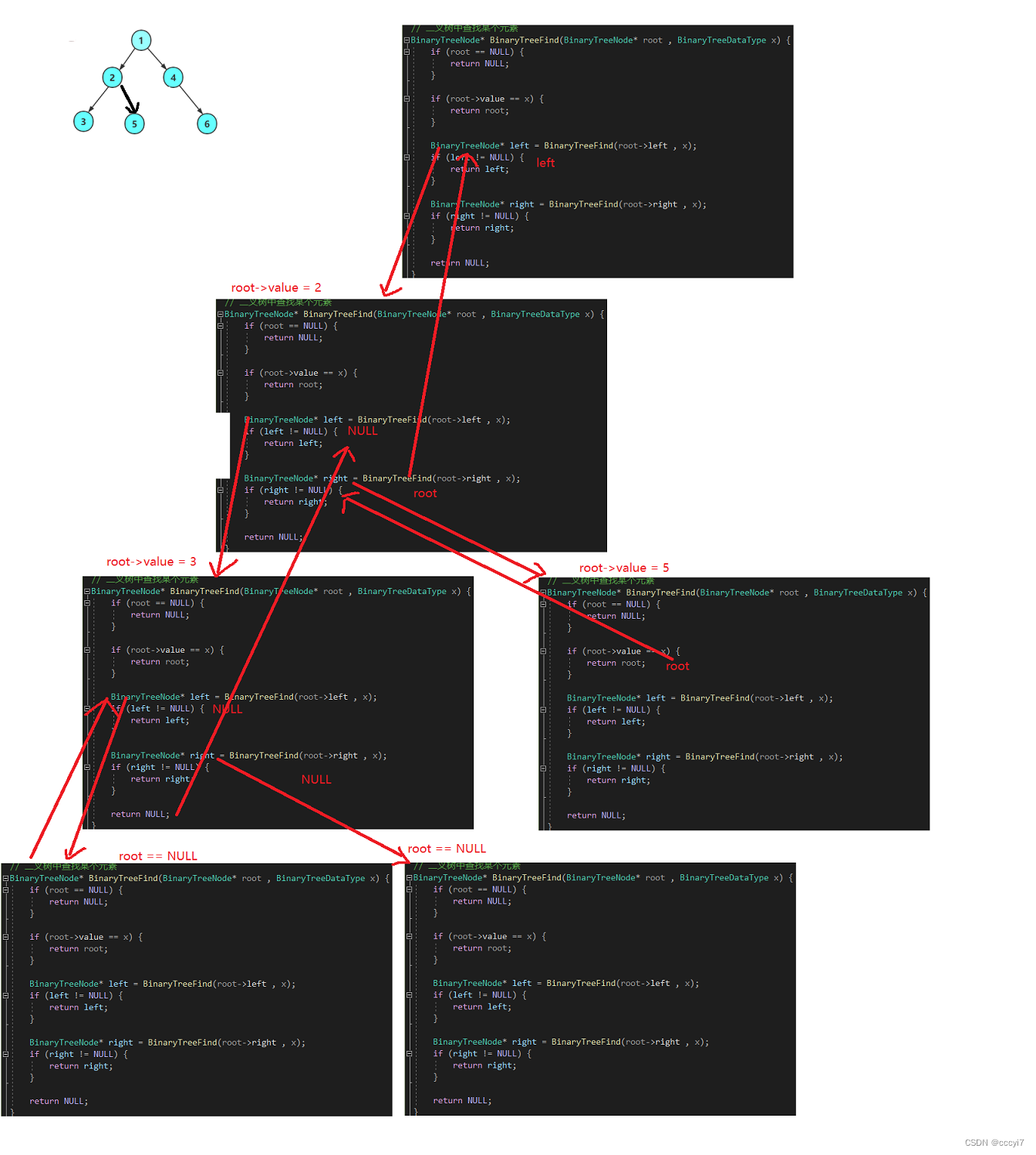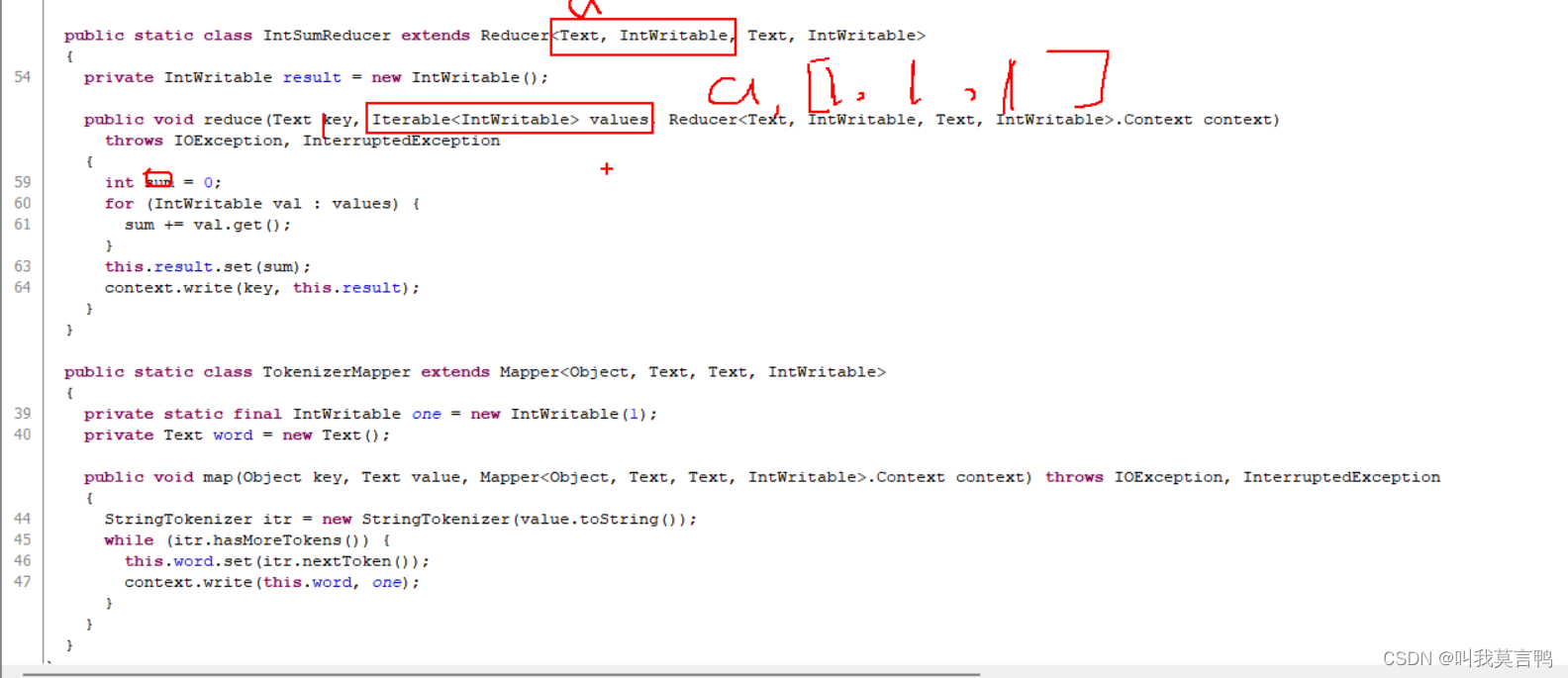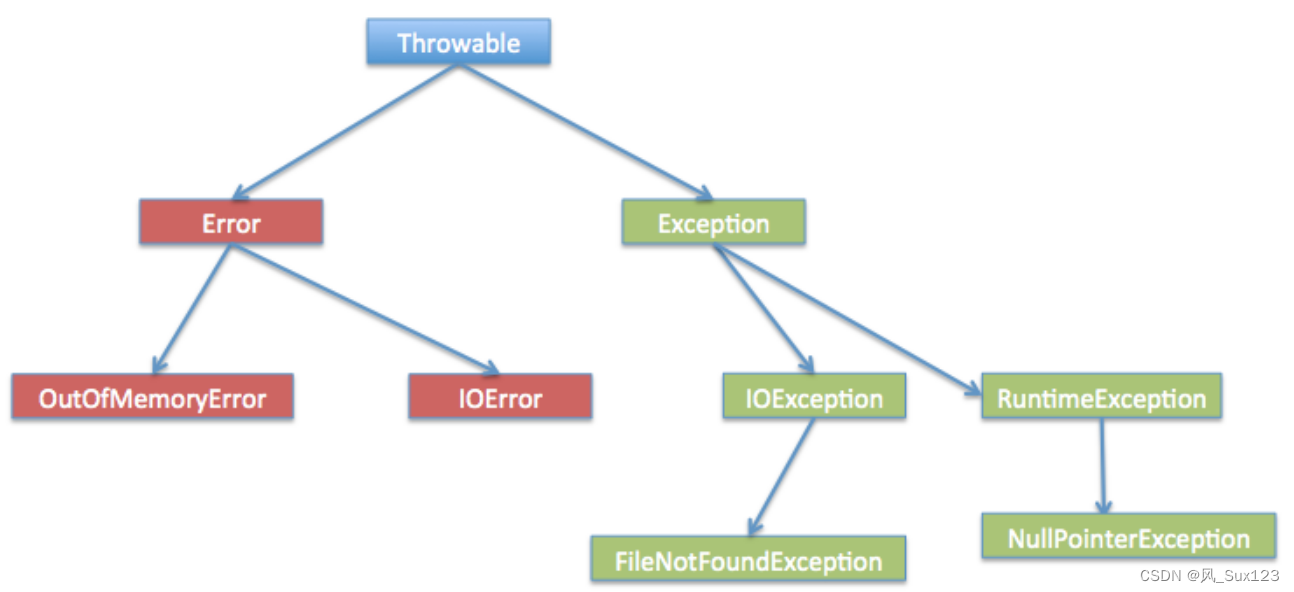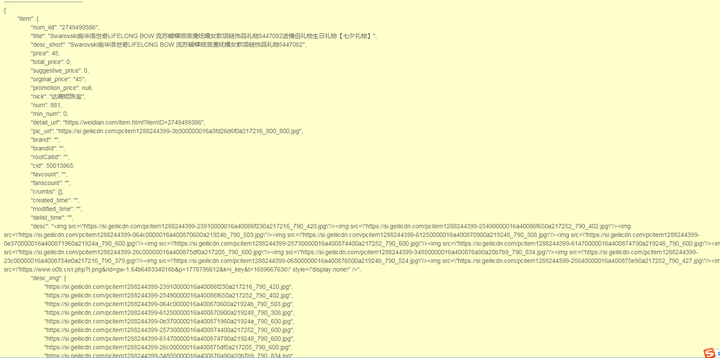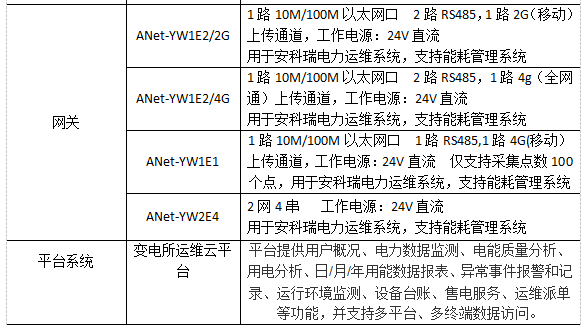⭐️ 前言
✨ 二叉树的概念性质
⭐️ 二叉树链式结构的实现
结构定义:
#include <stdio.h>
#include <stdlib.h>
#include <assert.h>
typedef int BinaryTreeDataType;
typedef struct BinaryTreeNode {
BinaryTreeDataType value;
struct BinaryTreeNode* left;
struct BinaryTreeNode* right;
}BinaryTreeNode;
⭕️ 二叉树的遍历
按照规则,二叉树的遍历分为:前序/中序/后序的递归遍历。
- 前序遍历(PreOrder Traversal):访问根节点的操作发生在遍历其左右子树之前。
根 -> 左子树 -> 右子树
- 中序遍历(InOrder Traversal):访问根节点的操作发生在遍历左右子树之间。
左子树 -> 根 -> 右子树
- 后序遍历(PostOrder Traversal):访问根节点的操作发生在遍历其左右子树之后。
左子树 -> 右子树 -> 根

PreOrder 代码:
// 前序遍历递归 根 -> 左子树 -> 右子树
void PreOrder(BinaryTreeNode* root) {
if (root == NULL) {
printf("# ");
return;
}
printf("%d ", root->value);
PreOrder(root->left);
PreOrder(root->right);
}
前序递归流程图:

前序递归遍历顺序为:1 2 3 # # # 4 5 # # 6 # #
InOrder 代码:
// 中序遍历递归 左子树 -> 根 -> 右子树
void InOrder(BinaryTreeNode* root) {
if (root == NULL) {
printf("# ");
return;
}
InOrder(root->left);
printf("%d " , root->value);
InOrder(root->right);
}
中序递归流程图:
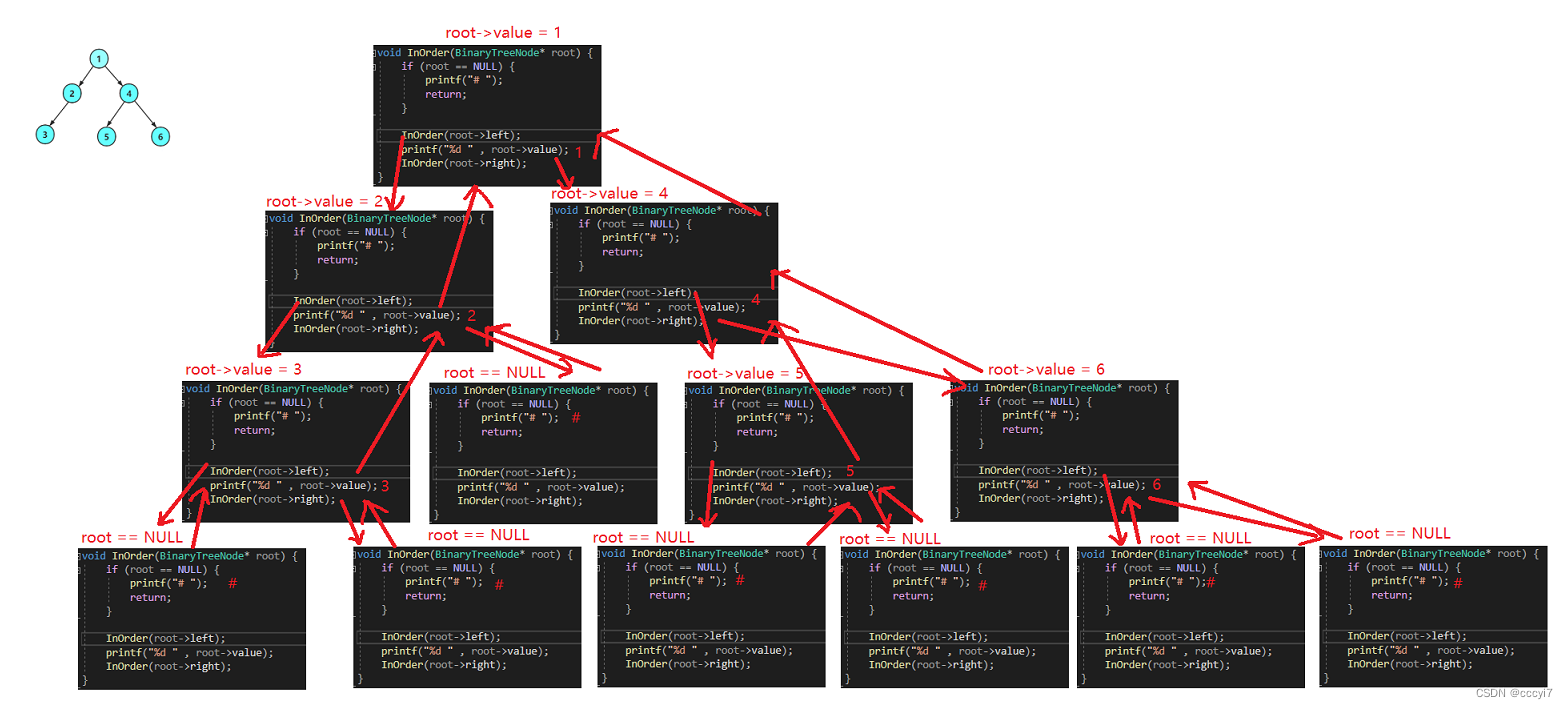
中序递归遍历顺序为:# 3 # 2 # 1 # 5 # 4 # 6 #
PostOrder 代码:
// 后序遍历递归 左子树 -> 右子树 -> 根
void PostOrder(BinaryTreeNode* root) {
if (root == NULL) {
printf("# ");
return;
}
PostOrder(root->left);
PostOrder(root->right);
printf("%d " , root->value);
}
后序递归流程图:
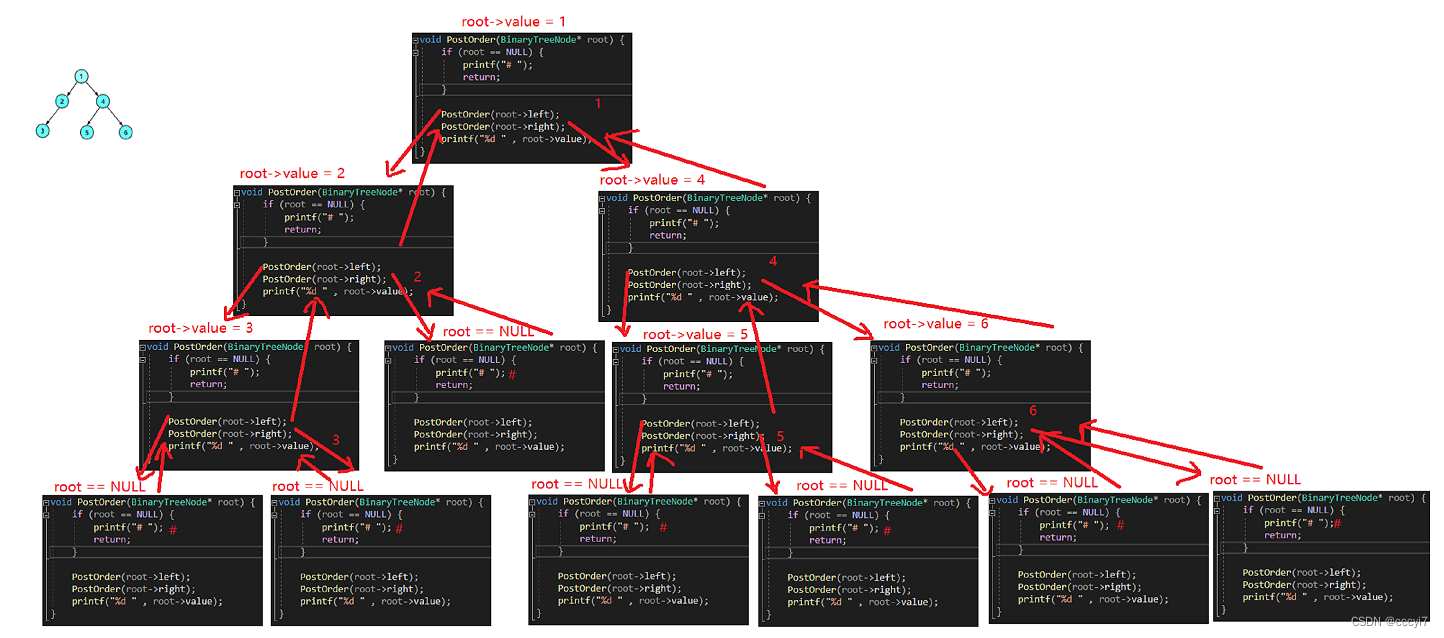
后序递归遍历顺序为:# # 3 # 2 # # 5 # # 6 4 1
注:# 代表空树
⭕️ 二叉树的其他接口
// 节点的数量
int BinaryTreeSize(BinaryTreeNode* root);
// 叶子节点的数量
int BinaryTreeLeafSize(BinaryTreeNode* root);
// 求k层节点的个数
int BinaryTreeKLevelSize(BinaryTreeNode* root , int k);
// 二叉树中查找某个元素
BinaryTreeNode* BinaryTreeFind(BinaryTreeNode* root , BinaryTreeDataType x);
BinaryTreeSize 代码:
// 节点的数量
int BinaryTreeSize(BinaryTreeNode* root) {
if (root == NULL) {
return 0;
}
return 1 + BinaryTreeSize(root->left) + BinaryTreeSize(root->right);
}
BinaryTreeSize 递归流程图:

BinaryTreeLeafSize 代码:
// 叶子节点的数量
int BinaryTreeLeafSize(BinaryTreeNode* root) {
if (root == NULL) {
return 0;
}
if (root->left == NULL && root->right == NULL) {
return 1;
}
return BinaryTreeLeafSize(root->left) + BinaryTreeLeafSize(root->right);
}
BinaryTreeLeafSize 递归流程图:

BinaryTreeKLevelSize 代码:
// 求k层节点的个数
int BinaryTreeKLevelSize(BinaryTreeNode* root , int k) {
assert(k >= 1);
if (root == NULL) {
return 0;
}
if (k == 1) {
return 1;
}
return BinaryTreeKLevelSize(root->left , k - 1) + BinaryTreeKLevelSize(root->right , k - 1);
}
BinaryTreeKLevelSize 递归流程图:
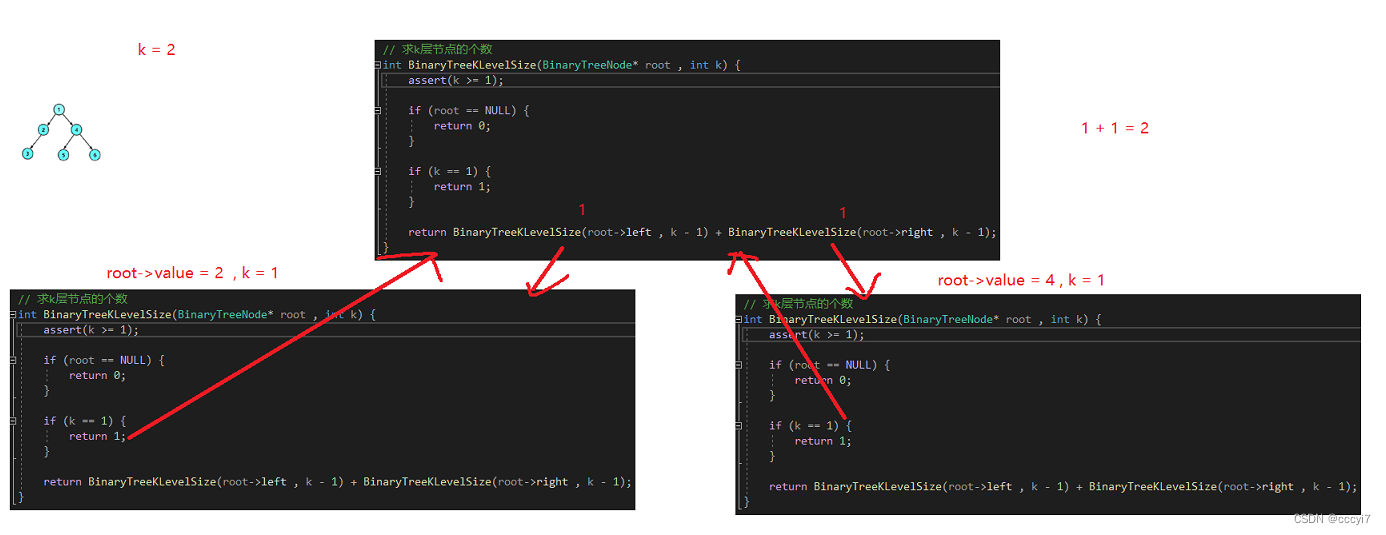
BinaryTreeFind 代码:
// 二叉树中查找某个元素
BinaryTreeNode* BinaryTreeFind(BinaryTreeNode* root , BinaryTreeDataType x) {
if (root == NULL) {
return NULL;
}
if (root->value == x) {
return root;
}
BinaryTreeNode* left = BinaryTreeFind(root->left , x);
if (left != NULL) {
return left;
}
BinaryTreeNode* right = BinaryTreeFind(root->right , x);
if (right != NULL) {
return right;
}
return NULL;
}
BinaryTreeFind 递归流程图:
